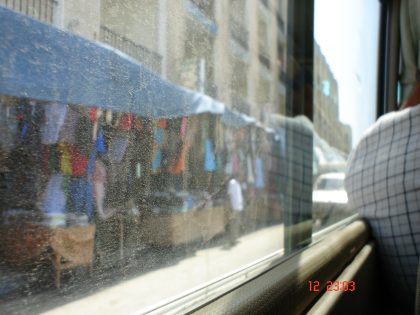
How to fight for democracy
The events of May Day 1998 in Nigeria and lessons from Ola Oni on fighting for democracy in multi-ethnic societies.

The events of May Day 1998 in Nigeria and lessons from Ola Oni on fighting for democracy in multi-ethnic societies.

In the 1980s, the South African arts collective Vakalisa Art Associates reclaimed time as a tool of social control through their subversive calendars.

The film 'No Place But Here' uses VR or 360 media to immerse a viewer inside a housing occupation in Cape Town. In the process, it wants to challenge gentrification and the capitalist logic of home ownership.

The music and art of Lauryn Hill and Chiwoniso Maraire combined sexiness with political consciousness, offering Black women a way out of rigid categorization.

After the Arab Spring, the African left was left demoralized and disorganized. However, a recent book argues that the revolution continues in quotidian life.

Zimbabwe is not Mugabe, Nkomo, Mnangagwa or Chamisa. A new Afro-electronic music duo is giving the country’s complexity a soundtrack.

How are we to discuss and deal with colonization in Africa without using language that acknowledges that we were something before colonization?

Artificial Intelligence is here to stay. The question is whether we align AI to promote human rights or to defend private property and exploitation.

Instead of listing the books that help her write 'Written Out: The Silencing of Regina Gelana Twala,' the author notes five books that shaped Regina Gelana Twala.

A new film on the life of Walter Rodney gives a glimpse of his radical solidarity politics and centers on his family, who struggled and suffered with him.

Against Mahikeng’s failure to honor and preserve his legacy, a new Setswana biography examines Plaatje’s years in this South African town, once a regional capital.

If a better world is possible, let us meditate on its constituent parts—the institutions, communities, and relationships, argues Felwine Sarr.

The author reflects on books that offer a long-historical perspective on African literature and history.

In doing the intellectual activist work of editing and supporting cultural production, literary magazines have been crucial for Black cultural renaissance.

The film 'Neptune Frost' reduces the gulf between Africanfuturism and Afrofuturism by connecting their shared vision against violent systems of domination.

Does Afrobeats come from the continent or the diaspora. This reviewer of a new book on the genre's history and rapid takeover of our airwaves and playlists, argues we need to center Africa more.

Thierno Souleymane Diallo’s latest film traces his search for what is likely the first film made by a Guinean, in the process asking: how is a film culture possible when the infrastructure and institutions are lacking?

In South Africa and elsewhere, toxic masculinity is an outcome of modern individualism rather than tradition.

The award-winning Djiboutian author, Abdourahman Waberi, shares his reflections on writing, power and living with a disability.

With its new edition, Penguin Classics disfigures Zimbabwean writer Dambudzo Marechera’s novel 'The House of Hunger.'